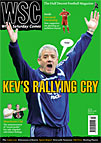 Should NRR replace QPR in the league tables? Thom Gibbs reports on a takeover by Formula One bosses and a steel magnate that seems to promise much more than mere survival but carries risks of its own
Should NRR replace QPR in the league tables? Thom Gibbs reports on a takeover by Formula One bosses and a steel magnate that seems to promise much more than mere survival but carries risks of its own
On the evening of August 14, 2007, during a League Cup match against Leyton Orient, Gianni Paladini’s world was in tatters. QPR’s Italian chairman thought he had secured a deal to save the club from impending administration. Flavio Briatore, managing director of the Renault Formula One team, was set to take over, until significant shareholder Antonio Caliendo balked at Briatore’s offer. The deal looked dead. Rangers were destined for financial meltdown, possibly complete extinction. They also lost 2-1 to Orient.
Five months later, another cup tie, and “clash of the billionaires” newspaper stories were looking as tired as Chris Moyles on the first day of a new-year fitness regime. Eventually, the deal had gone through. With Briatore and two other new investors looking on, Rangers lost to Chelsea, but a decent performance and the club’s new status as “the richest in the world” meant 6,500 away fans went home happy.
F1 CEO Bernie Ecclestone (worth an estimated £2 billion) wasn’t at that game, but had abandoned a prolonged flirtation with Arsenal and settled for their ugly friend from west London instead. Just in time for Christmas, steel magnate and Britain’s richest man Lakshmi Mittal bought a 20 per cent stake in QPR. What on earth was going on? Pumping huge sums of money into a club never far from a crisis or the bottom of the Championship begs several questions. With even the relatively pauper-like wealth of Briatore (a mere £70 million), an established Premier League club would surely be a more logical investment. Mittal had been linked with moves for Everton and Wigan, so why QPR?
The worry for Rangers fans whenever new investment has been mooted centres around the Loftus Road stadium. A prime slice of land would be attractive to unscrupulous investors, but planning permission restrictions enforced by Hammersmith and Fulham council would make a lucrative sale for development difficult. In any case, with the ground generously valued at £25m, any profits to be made would be pocket change for the billionaires. While Shepherds Bush patently lacks the glamour of Chelsea’s King’s Road, a huge new shopping centre should have a regenerative effect. Yet however vibrant the Bush becomes, Rangers are unlikely to attract many floating fans with Chelsea, Fulham and Brentford so close. The investors have made the right noises about being in it for the long haul, but some supporters are understandably cautious that it’s all too good to be true.
With the gravy train of the Premier League gravy train at least a few seasons away, could it be that the investors aren’t just in it for the money? Ben Kosky, a sports writer for the Kilburn Times, believes so: “They want success, prestige and a nice place to entertain their corporate clients. Football clubs have become something to show off to your peers, a status symbol for the incredibly wealthy.”
Rangers used January to recruit several new players and expectation is palpably growing with each addition. Luigi De Canio, with the CV of an Italian Dave Bassett, was appointed manager in November and has impressed in spells, if not conclusively proved he is cut out for the Championship. But lazy members of the media and optimistic fans are all but assuming that Rangers will be in the top flight before long, and with more extravagant spending likely there is a danger that QPR will become hated in the same way that Chelsea are.
The hypocrisy of some of the most vociferous critics of Chelsea’s classless ascent gleefully singing “1-0 to the billionaires” when QPR went in front was not lost on the more reflective. Dave Thomas, editor of fanzine A Kick Up The Rs, says: “I think you can have money and still have values, and we can be an example of being rich but gracious. What we want is for the club to have a sound basis so that if, heaven-forbid, a helicopter with the three of them in goes down, we could be self-sustaining.”
Signs are promising that there will be a new era of success and proper investment, but the Championship is the archetypal “difficult league to get out of”, traditionally not dominated by its biggest spenders. What happens to QPR if, like innumerable clubs before them, they splash the cash and it fails to bring immediate results? With ulterior motives seemingly not an issue, the biggest danger is that the billionaires, like children playing a difficult video game, will get bored when they can’t finish a level, and find something else to play with.
From WSC 253 March 2008